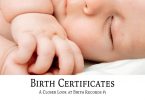When you are looking for birth records, you might not find an official birth certificate. This is usually because the place where your ancestor was born did not require official birth registration by law at that time. It can also be because the registration requirement was new and not everyone was following it yet. The farther you go back in time in your research, the more likely it is that there was no official registration requirement for a birth at all. This does not mean, however, that you cannot discover when your ancestor was born, or at least get documentation that gives you a close approximation of it. The most common type of non-birth certificate birth record you will find is a baptismal record.
What are baptismal records? Just what the name says—a record of when a child was baptized. While some Christian denominations did not perform infant baptism, this belief did not enter most of the Christian churches that adopted it until the 1800s. Before that, baptizing a child as soon as possible after it was born was almost standard across all Christian denominations. When the Roman Catholic church was the only Christian church in the western world, baptizing infants was considered crucially important. These medieval Catholics believed that someone had to be baptized to enter heaven, and with the high percentage of infant mortality, baptizing the baby ASAP ensured the soul of the child went right to heaven without a possibly millennia-long stay in purgatory first.
The Roman Catholic practice of infant baptism translated to other denominations as they came into existence. These baptisms almost always generated a record within the church. Many of those records have been located and recorded by professional genealogists today, and can be found in a variety of places, both online and offline.
In the days before official birth registration was required, the baptismal record may be the closest thing you will find to an actual birth date for an ancestor. While most churches did try to baptize infants as soon after birth as possible, there were exceptions. In rural locations, the minister might be a traveling one who only came to the child’s area every few months, or even once a year, or more. In these cases, the baptismal date may be days, weeks, months, or even a few years after the child was born. You may even find cases where parents who had several children in between visits by the traveling minister had all of the children born in the interim baptized together.
Still, a baptismal record will give you a decent idea of when a child was born within a reasonable timeframe, and further records the child generated in its life may help you narrow down your search to a more exact date.
The typical baptismal record will include the child’s name, date, and place of baptism, the name of the father, and the name of the minister who baptized him or her. If you’re very lucky, the first name of the mother will be on there, as well. If you’re incredibly lucky, the record might also include her maiden name. If the child was Catholic, the names of the baptismal sponsors or godparents of the child will probably be included, and these names are worth researching, as they could be (and usually were) relatives of the child. This will help you add more names to that branch of your family tree.






